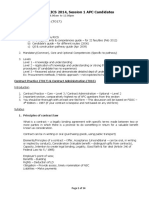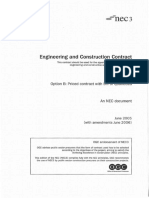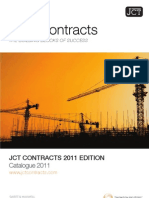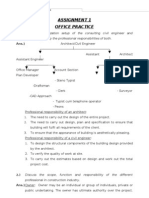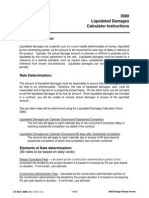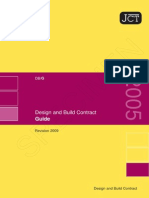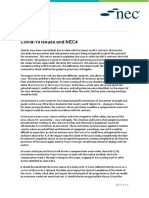Construction Issues in Oman
Construction Issues in Oman
Uploaded by
poula mamdouhCopyright:
Available Formats
Construction Issues in Oman
Construction Issues in Oman
Uploaded by
poula mamdouhCopyright
Available Formats
Share this document
Did you find this document useful?
Is this content inappropriate?
Copyright:
Available Formats
Construction Issues in Oman
Construction Issues in Oman
Uploaded by
poula mamdouhCopyright:
Available Formats
LEGAL ISSUES IN OMAN CONSTRUCTION CONTRACTS
Construction Contracts
Slide 1 - Introduction
This evening I shall be discussing common legal issues in Oman Construction Contracts. My
talk will focus on the role of FIDIC in shaping Oman construction contracts and the problems
that the adoption of FIDIC potentially causes when using these contracts
Slide 2 – Types of Contract
There are two basic types of construction contracts recognised by Oman Law. The first is that of
privately financed contracts regulated by the Egyptian Civil Code (Article 646 to 667). The second is
that of publicly financed contracts, known commonly as government contracts.
The essential difference between these two varieties of construction contracts is that disputes
governing government contracts have the exclusive jurisdiction of the administrative court. Privately
financed contracts are considered civil law contracts and disputes concerning such contracts go to the
ordinary court. A construction contract is classed as a government contract if the contract is
concluded by the government or one of its entities is holding a public authority or is in pursuit of a
public service and as such the contract gives the government special powers not common in the
private sector. The most important of such powers is the power of the government to modify the
contract unilaterally in the interest of public service concerned and the obligation of the contractor not
to stop the works in order to ensure the continuity of providing the public service or utility on condition
of being fully compensated for any loss suffered. With the exception of these special powers
government contracts a still subject to the same rules as civil contracts.
I will focus on the standard government contract for Building and Civil Engineering Works and
Electrical & Mechanical Works.
Slide 3 - The Role of FIDIC
FIDIC is an acronym for The International Federation of Consulting Engineers. FIDIC publish
form of standard conditions of contract for works of civil engineering construction especially
designed for use in international projects The first edition of the FIDIC standard conditions
.
was published in 1957. Second and third editions were published in 1963 and 1977
respectively.
The fourth edition (The Red Book 1987) of the FIDIC standard conditions was adopted in
more than 30 percent of civil engineering contracts carried out in the Middle East in the
1990s. The Oman standard form for civil engineering projects in Oman is based on FIDIC's
Red Book. Throughout this talk I will simply refer to the conditions as the Red Book.
When deciding on an international set of building conditions, FIDIC chose to base the
conditions on the Institute of Civil Engineers (ICE) form, which in turn was based on the
English law concepts, rooted in the common law system and construction industry practices
in the United Kingdom. Therefore FIDIC conditions are based on UK domestic contract law.
Slide 4 – The problems adopting a contract based on common law concepts
The changes made by FIDIC to transform the ICE form to an international form were
insubstantial. As you are aware, Oman's legal system is based on civil code principles and in
particular, the Egyptian Civil Code. Oman by adopting a form of building conditions based on
a common law system creates the first legal issue with Oman Construction contracts.
Draft: 21 October 2008
DXW/54321.20000/56033.03 Page 1
Professor Duncan Wallace has clearly pointed out this problem in his comments on the use
of FIDIC conditions in an international context stating that:
"There has been far too little internationalisation of the contract in this sense, which remains
far too domestically English in character and language".
Professor Wallace goes on to say:
"The contract is so unremittingly and peculiarly English in language and concepts at a
number of points that the task of any translator becomes impossible without profound
knowledge of English Law and industrial practices".
Therefore it is not surprising to find that considerable number of disputes in Oman due to the
contradiction between the English version and an inaccurate Arabic translation.
On many occasions the intended aims of the FIDIC clauses supported by the English legal
system in the UK construction industry practices may lead to a different result for the same
FIDIC clauses governed by the Egyptian Civil Code and Oman Law.
Generally speaking, most of the solutions and concepts adopted under the FIDIC conditions
are compatible with the Egyptian Civil Code and Oman Law. However as I intend to illustrate
now some of the FIDIC clauses embodying common law concepts are not easy to reconcile
with the Egyptian Civil Code and Oman Law principles in general.
Slide 5 – Liquidated Damages
The term "liquidated damages" which is a legal term used in the common law system is a solution
envisaged in the red book for any default by the contractor completing the works on time. The red
book provides that, "if the contractor shall fail to achieve completion of the works within the time
prescribed", then the contractor is to pay to the Developer the sum stated in the contract as liquidated
damages for such default and not as a penalty.
There is no defined term for liquidated damages under Oman law. There is also a problem when the
term liquidated damages is translated, as in Arabic, the term "liquidated damages" when literally
translated means "fines".
Penal clauses are recognised by Article 223 of the Egyptian Civil Code, which gives the parties to the
contract the right to "fix in advance the amount of damages either in the contract or in a subsequent
agreement".
However, Article 224 clearly states that damages fixed by agreements are not due; if the debtor
establishes that the creditor has not suffered any loss. The judge may refuse the amount of these
damages; if the debtor establishes that the amount fixed was greatly exaggerated although the
principle obligation has been partially performed. Any agreement to the contrary to the provisions of
the two preceding paragraphs is void.
Furthermore Article 225 of the Egyptian Civil Code provides that:
"When the loss exceeds the amount fixed by the contract, the creditor cannot claim the increased
sum, unless he is able to prove that the debtor has been guilty of gross negligence"
As you can see these Articles heavily favour a contractor. A developer may wish to fix high sums of
liquidated damages to ensure the contractor performs the work in line with the time frames in the
contract. However a well-advised contractor may allow a developer to insert such high sums knowing
that a judge may well not enforce the sum against the contractor due to the provisions contained in the
Articles.
Draft: 21 October 2008
DXW/54321.20000/56033.03 Page 2
Slide 6 - Increase In Prices of Raw Materials
The Red Book governs the relationships between the Developer who usually owns the land, the
Contractor who carries out the works and the Engineer who supervises the works.
Under the Red Book the engineer has the power to fix rates for additional works and materials. The
first stage is for the engineer and the contractor to try to agree a suitable rate or price. However, in the
event of disagreement, the engineer shall fix such other rate or price which shall in his opinion be
reasonable and proper having regard to the circumstances.
This has a potential to cause problems for the contractor as the engineer is in effect employed by the
Developer and may choose to fix the prices or rates lower than the market rate, which may leave the
contractor out of pocket.
This issue is further compounded in government contracts as Article 658/3 of the Egyptian Civil Code
states that:
"The contractor has no claim to an increase in raw materials, labour or any other item of expenditure,
even if such increases in the price are so great as to render the performance of the contract onerous".
Therefore it is advisable for a contractor to protect himself by inserting a special clause, for example:
"If after the tender's opening date there is an increase in the price of the governmental subsidised
cement, steel and timber, or in the minimum wages of the permanent labour for a government decree
or order, the contractor shall be reimbursed for any additional cost resulting from the exception of the
contract work".
Slide 7 – Impartiality of the Engineer
In theory the engineer has a strongly independent stance, even though the Developer and the service
he provides are usually regulated by a separate agreement for employment with the developer pay
him for.
In many Oman government contracts, the engineer and all the engineer's representatives are
government officers whose loyalties are naturally to the government. The danger then, is that the
principle of strict impartiality on the part of the engineer and his representatives may suffer.
It is a danger to be guarded against because although the engineer is given wide discretionary powers
he may ultimately have to defend the basis of his decisions during arbitration or dispute resolution
proceedings.
Although it is perfectly legitimate for the engineer to watch the interests of his Developer on matters
ruled by the contract the engineer must act impartially without favouring either of the two parties. His
first loyalty must be to the terms of the contract.
A key feature of the red book 1987 was the introduction of an express term, which required the
engineer to act impartially when given a decision or taking any action, which might affect the rights and
obligations of the parties, whereas the previous editions had assumed this implicitly.
The role of engineer in Oman has come under attack from both Developer and contractor on the
question of bias.
On the one hand the engineer has been accused by the contractor of being biased and favouring the
Developer because:
Draft: 21 October 2008
DXW/54321.20000/56033.03 Page 3
(1) His fee is paid by the owner or developer referred to as employer under the red book
(2) He has acted as advisor to the Developer prior to construction and may wish to continue the
advisory role upon completion of the construction stage
(3) He is required to consult with the Developer prior to making certain decisions and therefore will
have these discussions at the back of his mind when making the decision.
It is quite clear for the above reasons why a contractor may suspect the engineer of colluding with the
Developer. The case is even stronger against the engineer when he is an employee of the developer,
as his future employment might well depend on his actions.
On the other hand, the engineer has been accused by the Developer as being biased towards the
contractor during the administration and execution of the contract in areas such as awarding
extensions of time and determining the amounts of claims, etc., in favour of the contractor. In general
it is sometimes claimed that he is too lenient towards the contractor thereby relieving him of certain of
his obligations under the contract.
It is interesting to note that the Red Book 1999 specifically states that the Engineer is employed by the
Developer and shall act in the Developer's interests.
Slide 8 – Working in an emerging market
Undertaking development projects in an emerging market can in itself cause a problem.
The Developer must be confident in the engineer's ability and professional integrity. This confidence
is necessary for a successful delegation of authority from the Developer to the engineer, in particular
where such authority relates to monetary matters.
However, such confidence can only develop with time after completion of many successful
assignments leading to the building of a successful professional relationship between the parties. As
Oman in a relatively new construction market, the selection of the engineer is often not based
developed professional relationships but as you would expect in an emerging market on fee
competition or other financial considerations particularly in a field where identification and precise
definition of a set of terms of reference is almost an impossible task.
In such situations the Developer has often resorted to allocating the authority of the engineer to
himself or an employee of his without considering the effect of which this assumption of authority as on
the independent role of the engineer under the conditions of contract. Some optimistic contractors do
not see the risks involved in such a contract and found no reason to be worried about the possible
adverse conditions or possible abuse of authority inherent in such situations.
Slide 9 – Conclusion
The Red Book does have some issues, however the booming construction industry in Oman
proves that the contract can deliver successful results for all parties concerned.
Draft: 21 October 2008
DXW/54321.20000/56033.03 Page 4
You might also like
- JCT Home Owner Contract TABLEDocument2 pagesJCT Home Owner Contract TABLEJamie CharlesworthNo ratings yet
- CPD On Ethical Landscape in Quantity Surveying (Bahrain 2016)Document25 pagesCPD On Ethical Landscape in Quantity Surveying (Bahrain 2016)chandanaNo ratings yet
- Clause 18: Exceptional Events: Written by Edward CorbettDocument1 pageClause 18: Exceptional Events: Written by Edward CorbettNishant SinghNo ratings yet
- @ Principle of Adverse Possession - CIVIL APPEAL NO 22 OF 2017 BHOKE KITANGITA... APPELLANT VERSGMENT NEWDocument14 pages@ Principle of Adverse Possession - CIVIL APPEAL NO 22 OF 2017 BHOKE KITANGITA... APPELLANT VERSGMENT NEWSaid ManenoNo ratings yet
- Practical Guide to the NEC3 Professional Services ContractFrom EverandPractical Guide to the NEC3 Professional Services ContractNo ratings yet
- Principles of Measurement (POMI) RDocument26 pagesPrinciples of Measurement (POMI) RRushard MsmNo ratings yet
- Details of Malmaison Case - Eot PDFDocument3 pagesDetails of Malmaison Case - Eot PDFAjay DevNo ratings yet
- 02 Library of Standard Amendments To NEC ECC V1.0 201610Document17 pages02 Library of Standard Amendments To NEC ECC V1.0 201610Bruce WongNo ratings yet
- Techno Legal Aspect of FIDICDocument14 pagesTechno Legal Aspect of FIDICShivangi BajpaiNo ratings yet
- FIDIC Rainbow Suite-First 4 ArticlesDocument30 pagesFIDIC Rainbow Suite-First 4 ArticlesbkarabasevicNo ratings yet
- Pink Form - 1988 EditionDocument24 pagesPink Form - 1988 EditionCitizen Kwadwo AnsongNo ratings yet
- Contract Practice CPD 21 02 2014 PDFDocument14 pagesContract Practice CPD 21 02 2014 PDFManoj KumarNo ratings yet
- Sub Clause 1.15 Limitation of Liability PDFDocument4 pagesSub Clause 1.15 Limitation of Liability PDFBogdanNo ratings yet
- Nec 2006Document59 pagesNec 2006loots69No ratings yet
- JCTCatalogue 2011Document24 pagesJCTCatalogue 2011bappanaduNo ratings yet
- PP Assignment 1Document7 pagesPP Assignment 1Saket PandeyNo ratings yet
- Construction Disputes in OmanDocument2 pagesConstruction Disputes in OmanSamia MansourNo ratings yet
- Completion' Is The Key To Liquidated Damages: But What Is Completion?Document14 pagesCompletion' Is The Key To Liquidated Damages: But What Is Completion?Ahmed AbdulShafiNo ratings yet
- RICS Procurement and Tendering - Module 1-Week 4 5Document21 pagesRICS Procurement and Tendering - Module 1-Week 4 5Sumeet MishraNo ratings yet
- EOT FormDocument3 pagesEOT FormSai CharanNo ratings yet
- Implied DutiesDocument5 pagesImplied DutiesZinck HansenNo ratings yet
- P6 User GuideDocument222 pagesP6 User Guidesajid khanNo ratings yet
- 3080 Liqudated Damages CalculatorDocument3 pages3080 Liqudated Damages CalculatorShakthi ThiyageswaranNo ratings yet
- WWW - Bca.gov - SG SecurityPayment Others SOP FlowchartDocument1 pageWWW - Bca.gov - SG SecurityPayment Others SOP Flowchartpaulloh64No ratings yet
- CM 5Document10 pagesCM 5Ponian PianoNo ratings yet
- Nec4 Ecc Practice Note 1 1 - WebDocument2 pagesNec4 Ecc Practice Note 1 1 - WebSheilaNo ratings yet
- The RIAI Standard Form of Contract 2012 Edition - A ReviewDocument20 pagesThe RIAI Standard Form of Contract 2012 Edition - A ReviewpanjemadjoNo ratings yet
- RICSNew Rulesof Measurement PLPPresentation 20090520Document30 pagesRICSNew Rulesof Measurement PLPPresentation 20090520Kevin DonNo ratings yet
- 5 Bunni Managing Risk Ibc Oct05Document16 pages5 Bunni Managing Risk Ibc Oct05Khaled Hesham HyariNo ratings yet
- UK LL M Thesis - Murphy V Brentwood District CouncilDocument8 pagesUK LL M Thesis - Murphy V Brentwood District CouncilRajan UppiliNo ratings yet
- EoT in Circumstances of Concurrent DelayDocument5 pagesEoT in Circumstances of Concurrent DelayAnonymous 19hUyemNo ratings yet
- Industry Day SlidesDocument68 pagesIndustry Day SlidesthamestunnelNo ratings yet
- RICS - Paula Boast - Oman Arbitration and Dispute Resolution PDFDocument60 pagesRICS - Paula Boast - Oman Arbitration and Dispute Resolution PDFShijo PodiyanNo ratings yet
- City of Colombo Developmenty PlanDocument107 pagesCity of Colombo Developmenty PlanJeganath KabilNo ratings yet
- Contracting For Capital Projects Aace International: Decision To BidDocument1 pageContracting For Capital Projects Aace International: Decision To BidSucher EolasNo ratings yet
- Wilo Formula's BookletDocument40 pagesWilo Formula's BookletMuhammad Fahrul Fauzi100% (1)
- FinalSubmission - Vedhakumar RamadossDocument42 pagesFinalSubmission - Vedhakumar RamadossDXBGs - BotNo ratings yet
- FIDICs Red Book 1999 Edition A Study RevDocument5 pagesFIDICs Red Book 1999 Edition A Study RevDonald MingoyNo ratings yet
- Guide JCT 2005 Design Built Rev 2009Document44 pagesGuide JCT 2005 Design Built Rev 2009seanbeagNo ratings yet
- NEC3 ContractDocument15 pagesNEC3 ContractNalini TiwariNo ratings yet
- Competency Guide: Contract PracticeDocument1 pageCompetency Guide: Contract PracticeGamini KodikaraNo ratings yet
- Article - Application of Liquidated DamagesDocument14 pagesArticle - Application of Liquidated DamagesYayank AteulNo ratings yet
- Claims and Adjudication Under 2017 Edition FIDIC Contracts: November 2018Document28 pagesClaims and Adjudication Under 2017 Edition FIDIC Contracts: November 2018pratip_bNo ratings yet
- Moragolla Hydropower Project: BSC - QSC M - PT - 21.1 Course WorkDocument16 pagesMoragolla Hydropower Project: BSC - QSC M - PT - 21.1 Course WorkKavindya LiyangodageNo ratings yet
- Newtech International DWC-LLC Office 452, Building 4 Business Park Dubai World Central P.O.Box: 23022 Dubai UAEDocument1 pageNewtech International DWC-LLC Office 452, Building 4 Business Park Dubai World Central P.O.Box: 23022 Dubai UAEHuda ManaffalNo ratings yet
- Short Form of Contract TTIADocument22 pagesShort Form of Contract TTIAworkspace.1099No ratings yet
- FIDIC Certified Contracts Manager (FCCM)Document5 pagesFIDIC Certified Contracts Manager (FCCM)shadi qususNo ratings yet
- JCT Flowchart - JCT 2016 Intermediate Contract Delay and Extension of TimeDocument1 pageJCT Flowchart - JCT 2016 Intermediate Contract Delay and Extension of TimeShashi PradeepNo ratings yet
- Covid 19 and NEC4 - 1Document2 pagesCovid 19 and NEC4 - 1Jesh SawNo ratings yet
- Price List - Fidic DocumentsDocument3 pagesPrice List - Fidic DocumentsShahnawaz AzizNo ratings yet
- CLJ 4 Barry ArticleDocument14 pagesCLJ 4 Barry ArticleGwapito TresNo ratings yet
- Petty Contract BookletDocument28 pagesPetty Contract BookletGeeta RamsinghNo ratings yet
- Daya CMT SDN BHD V Yuk Tung Construction SDN BHDDocument97 pagesDaya CMT SDN BHD V Yuk Tung Construction SDN BHDLinda AQNo ratings yet
- Standard Forms of ContractDocument3 pagesStandard Forms of ContractJaswin JonsonNo ratings yet
- BOQ O&M Estimate For 1 YearDocument15 pagesBOQ O&M Estimate For 1 YearDeep NamataNo ratings yet
- Construction Law in the United Arab Emirates and the GulfFrom EverandConstruction Law in the United Arab Emirates and the GulfRating: 4 out of 5 stars4/5 (1)
- Multi-Party and Multi-Contract Arbitration in the Construction IndustryFrom EverandMulti-Party and Multi-Contract Arbitration in the Construction IndustryNo ratings yet
- Paat Vs Court of Appeals, 266 SCRA 167, G.R. No. 111107, January 10, 1997Document2 pagesPaat Vs Court of Appeals, 266 SCRA 167, G.R. No. 111107, January 10, 1997Gi NoNo ratings yet
- DR. Ashok Kumar Mohapatra Moot Court PropositionDocument9 pagesDR. Ashok Kumar Mohapatra Moot Court PropositionSidhesh MohantyNo ratings yet
- Ban Compass 2010 Amended v. 2022Document40 pagesBan Compass 2010 Amended v. 20224b95ctjb7gNo ratings yet
- CORDILLERA BROAD COALITION, Petitioner, vs. COMMISSION ON AUDITDocument3 pagesCORDILLERA BROAD COALITION, Petitioner, vs. COMMISSION ON AUDITArthur Kenneth lavapizNo ratings yet
- Ioa Members List 3Document312 pagesIoa Members List 3raavansir095No ratings yet
- Factiva 20201103 1250 PDFDocument2 pagesFactiva 20201103 1250 PDFAnonymous xgqcVDsgrHNo ratings yet
- IOS Project: Debate Between Justice Breyer and Justice ScaliaDocument6 pagesIOS Project: Debate Between Justice Breyer and Justice ScaliaKamod PatelNo ratings yet
- 12 Re Letter of Atty. Estelito P. MendozaDocument2 pages12 Re Letter of Atty. Estelito P. MendozaJudy Ann ShengNo ratings yet
- Constitutional Law 1 Syllabus SY 2023Document7 pagesConstitutional Law 1 Syllabus SY 2023Nash PungsNo ratings yet
- Lagman V Medialdea, G.R. No. 231658, July 4, 2017Document2 pagesLagman V Medialdea, G.R. No. 231658, July 4, 2017Geronimo YapNo ratings yet
- Dagadas Vs Grand PlacementDocument3 pagesDagadas Vs Grand PlacementKyla Ellen CalelaoNo ratings yet
- Far Bye Laws - FinalDocument6 pagesFar Bye Laws - FinalAngelina JomohNo ratings yet
- United Nations Security CouncilDocument4 pagesUnited Nations Security CouncilAMINA JADOONNo ratings yet
- ESSAYS of RIZALDocument3 pagesESSAYS of RIZALJesse Maye SolaboNo ratings yet
- CGES Teachers Club Elections 2016Document9 pagesCGES Teachers Club Elections 2016CarlaGomezNo ratings yet
- Vol - CXXVI-No - .28 - The Energy Act-The Energy (Electricity Market, Bulk)Document52 pagesVol - CXXVI-No - .28 - The Energy Act-The Energy (Electricity Market, Bulk)MaxNgalaNo ratings yet
- Supreme Court: Gamboa and Gamboa For Petitioner. Office of The Solicitor General For RespondentDocument40 pagesSupreme Court: Gamboa and Gamboa For Petitioner. Office of The Solicitor General For RespondentMaria RumusudNo ratings yet
- Form 9BDocument5 pagesForm 9Broxana_4099292No ratings yet
- 2024-03-14-06-59-11Checklist-SG Visa - English Ver - 1st Jan 2024 - UpdatedDocument1 page2024-03-14-06-59-11Checklist-SG Visa - English Ver - 1st Jan 2024 - UpdatedhelalaldhulmaniNo ratings yet
- Best Team Memorial Respondents Slcu National Moot 13 2023Document32 pagesBest Team Memorial Respondents Slcu National Moot 13 2023sanikasunil1552No ratings yet
- Martial LawDocument14 pagesMartial LawBint e ArshadNo ratings yet
- Partnership CLVblogDocument114 pagesPartnership CLVblogdodong123100% (4)
- CC Rejia Eed - Id 726616Document1 pageCC Rejia Eed - Id 726616Enam ShafiqNo ratings yet
- The Divergence of Contract and PromiseDocument47 pagesThe Divergence of Contract and PromisesunilkNo ratings yet
- Module 6 WorkbookDocument45 pagesModule 6 WorkbookNatia KurdadzeNo ratings yet
- Student Info Sheet NewDocument3 pagesStudent Info Sheet Newhjrf8tnsynNo ratings yet
- IFALPADocument2 pagesIFALPAAli AmarNo ratings yet
- Powerpoint 131203022823 Phpapp01Document34 pagesPowerpoint 131203022823 Phpapp01PSSg Sadang Sheryl DNo ratings yet
- Enlightenment - Society Sees The Light ReadingDocument4 pagesEnlightenment - Society Sees The Light ReadingAnna CiccocioppoNo ratings yet












